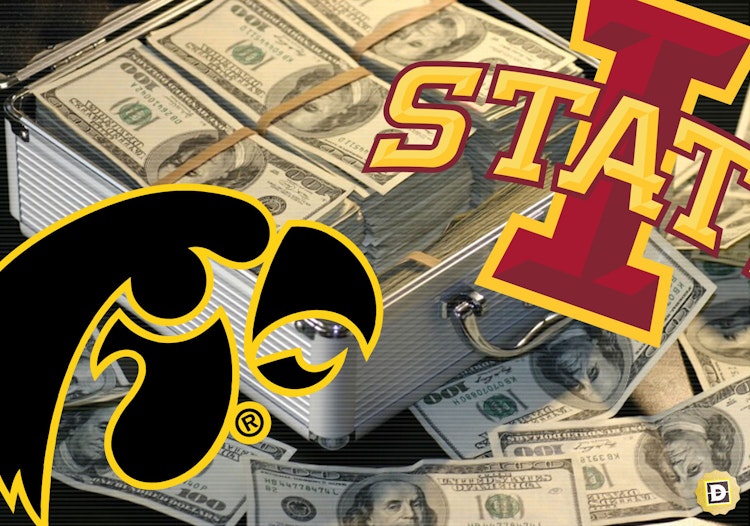Iowa and Iowa State College Athletes Involved In Gambling Scandal

Iowa and Iowa State athletics are being investigated for their involvement in another college sports gambling scandal. This comes a week after Alabama baseball fired their head coach in a gambling scandal where he knowingly bet on his team. The allegations at Iowa and Iowa State are significantly more widespread, and could be damaging for the relationship between gambling and college sports in all of the United States.
What happened, and what does it mean going forward? Here's what we know so far.
NEW FEATURE: Generate your own parlays with the Dimers Parlay Picker
111 people involved in Iowa and Iowa State Betting Investigation
University officials at the University of Iowa were notified of potential criminal conduct relating to sports betting on May 2. A few days later, they received a list of all the names involved in placing the bets, and notified the NCAA that there were potential violations.
The University of Iowa says 26 athletes in five sports are suspected of wagering on sports in violation of NCAA rules and Iowa State says some 15 of its athletes in three sports may have broken gambling rules. https://t.co/rXmAJNahcQ
— CBS News (@CBSNews) May 9, 2023
On May 8, Iowa announced that 111 total people were being investigated for their involvement, and that 26 of those 111 were Iowa athletes from various teams, including baseball, football, men's basketball, men's track and field and men's wrestling. An athletic department employee was also named in the findings.
Iowa State has not released similar details from their findings, but officials from the school did publicly confirm that "approximately 15" Cyclones athletes may have violated NCAA rules.
Who is investigating?
Two separate entities in the state of Iowa are tasked with investigating betting-related crimes within state lines: The Iowa Racing and Gaming Commission and the Iowa Division of Criminal Investigation. The former identifies abnormal betting patterns and alerts the latter when there may be criminal activity present.
The activities being investigated are currently unclear, and both investigating parties are keeping the details private. It is illegal for anyone under the age of 21 to bet in Iowa, and it also against NCAA rules for any athletes or athletic employees to bet on anything.
It is unclear if these allegations pertain to Iowa or Iowa State games involving themselves or their teammates - although the expectation is that it does not, which differs from the recent scandal at Alabama where their head coach knowingly helped a friend bet against his own team. The coach was fired at Alabama, and nobody at Iowa or Iowa State has met the same fate yet.
So what does all of this mean?
The timing of these findings coming to light so quickly after the Alabama scandal certainly thrusts the friction between college sports and gambling in America into the spotlight. It is important to note that these two situations are very different - as a grown adult betting on his own team that he coaches is much more of a horrific crime than college football players betting on NBA games before they are 21.
The NCAA has its own rules, similar to other professional leagues like the NFL, where Jameson Williams and four others were suspended for gambling. These rules will continue to come into light over the next few years as betting on sports becomes more and more recreationally acceptable for young adults, and as gambling partnerships continue to infiltrate college and professional sports.
There is no easy way to say what is right or what is wrong, or where this is headed in the future, but the biggest risk here is that betting on college sports could be made illegal to all bettors widespread across America. That seems like an unlikely outcome, given the high revenue totals that college football and college basketball bring to sportsbooks, but regulating betting on college sports is nearly impossible.
The option on the total opposite side of the spectrum here is that the NCAA and other sports leagues in America could altar rules, allowing athletes to place bets on sports that they don't play. But given the number of connections and access to inside information that these athletes have, that would only open the door for more scandals to occur. There are over 520,000 college athletes in the United States, and whether or not they place bets themselves, all college athletes have personal relationships with someone who bets.
The truth is we will likely only see more stories like this in the news going forward. How the states, universities and leagues themselves handle these on a case-by-case basis will be fascinating to watch, and could shape the future of college sports betting in America.
Let us know what you think, should college athletes be allowed to bet on sports? Let us know what you think on Twitter.




